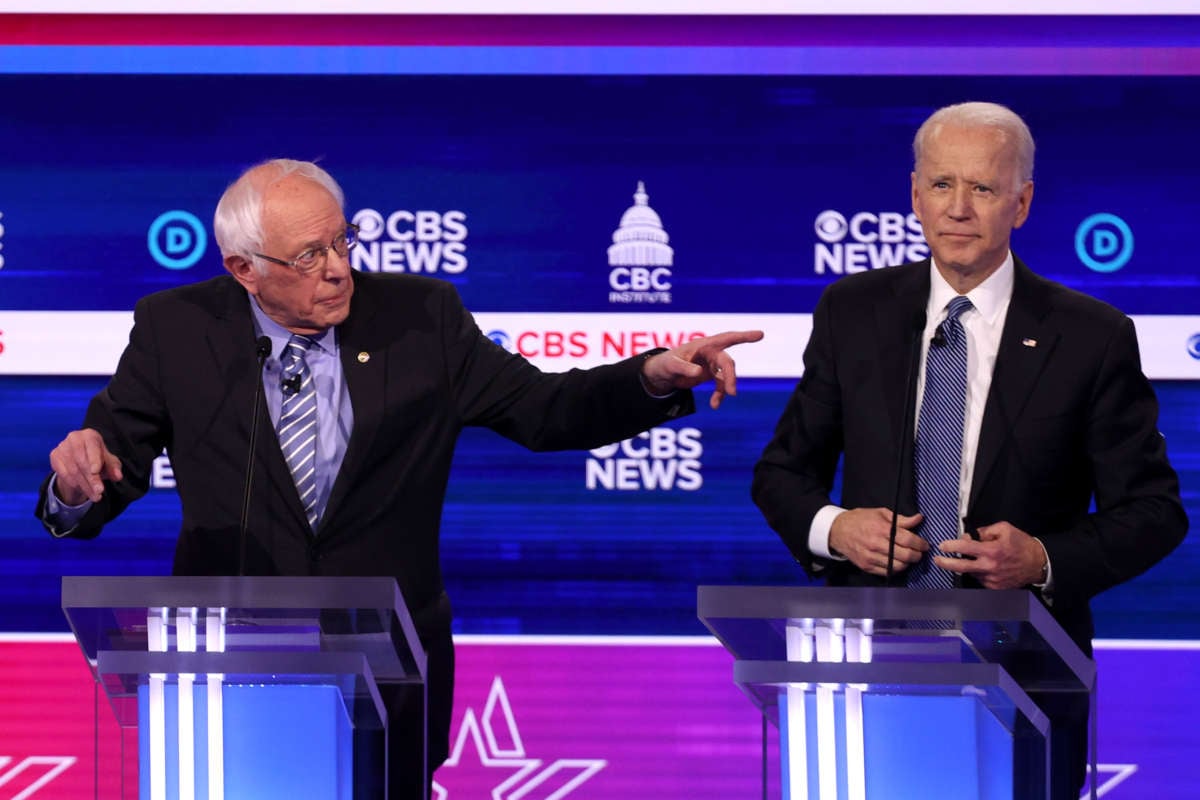Support justice-driven, accurate and transparent news — make a quick donation to Truthout today!
At this time last year, newly declared Democratic primary candidates were racing to outdo each other with escalating promises to shun big money support. Contenders vowed not to take corporate PAC money, to reject lobbyists’ dollars, to discourage super PACs, and to tell fossil fuel executives, “no, thank you.” Now, however, many seem to be in a wholly different sort of race: to put the most distance between themselves and their prior principled stands.
Joe Biden, who disavowed a super PAC last spring, welcomed it with open arms in the fall. Pete Buttigieg has been caught taking money from lobbyists and shadow lobbyists on more than one occasion (not to mention not-so-subtly attempting to coordinate with the super PAC VoteVets which is backing his bid).
Amy Klobuchar who, as a legislator, was an outspoken champion for campaign finance reform, has now joined the fleeing pack. Her decision to accept fundraising support from Brad Karp, the chairman of the law firm Paul, Weiss, Rifkind, Wharton & Garrison, was one of the earliest signs. Karp’s firm has been the subject of some controversy and the target of numerous protests thanks to its decision to represent Exxon Mobil. But Karp also happens to be a registered lobbyist, making Klobuchar’s decision to accept his support an unambiguous violation of her pledge not to take lobbyist money, enhanced by the fact that Karp is not merely a donor but also a significant “bundler” for her campaign.
And now, Klobuchar seems to have softened another of her previously strong stances: to discourage super PAC support. Earlier this month, a new super PAC, Kitchen Table Conversations, formed to back Klobuchar’s bid. The PAC plans to spend at least seven figures on ads in Nevada, South Carolina, and Super Tuesday states. While the campaign maintains that it doesn’t want help from super PACs, its nearly inaudible protests aren’t convincing anyone.
Some might decry these campaign finance standards as meaningless “purity tests,” but Klobuchar and others’ reversals are, in fact, consequential. Let’s put aside, for a moment, what it tells you about a candidate’s likely resolve as president if they can’t even stick to a promise for a year on the campaign trail. Arguably more concerning is what these violations mean for the composition of a candidate’s administration. With each broken pledge, a candidate becomes more dependent on the big money interests that have for so long high-jacked our democracy. And that, in turn, makes it all the more likely that that candidate will lean on those big dollar donors, fundraisers, and super PAC contributors for advice when it comes time to staff the next administration. That is how you get, for example, a Treasury department staffed with former Goldman Sachs employees, or an Agriculture Department chock full of Big Ag titans (not an idle concern with respect to Klobuchar).
As the past several decades have demonstrated, it is the public interest that suffers when this status quo is perpetuated.
So for all the talk last year about how much progress the Democratic establishment had made on campaign finance, it sure is starting to seem like old habits are hard to shake.
A further sign of the times: As the Center for Economic and Policy Research were preparing to publish this piece, the organization was disturbed to learn that a super PAC had formed to support Senator Elizabeth Warren’s bid for the Democratic nomination. Senator Warren is, of course, equally obligated to vociferously disavow their support.
A terrifying moment. We appeal for your support.
In the last weeks, we have witnessed an authoritarian assault on communities in Minnesota and across the nation.
The need for truthful, grassroots reporting is urgent at this cataclysmic historical moment. Yet, Trump-aligned billionaires and other allies have taken over many legacy media outlets — the culmination of a decades-long campaign to place control of the narrative into the hands of the political right.
We refuse to let Trump’s blatant propaganda machine go unchecked. Untethered to corporate ownership or advertisers, Truthout remains fearless in our reporting and our determination to use journalism as a tool for justice.
But we need your help just to fund our basic expenses. Over 80 percent of Truthout’s funding comes from small individual donations from our community of readers, and over a third of our total budget is supported by recurring monthly donors.
Truthout has launched a fundraiser to add 500 new monthly donors in the next 10 days. Whether you can make a small monthly donation or a larger one-time gift, Truthout only works with your support.
